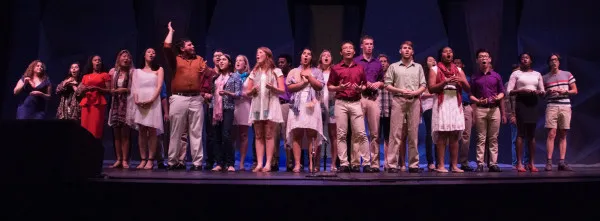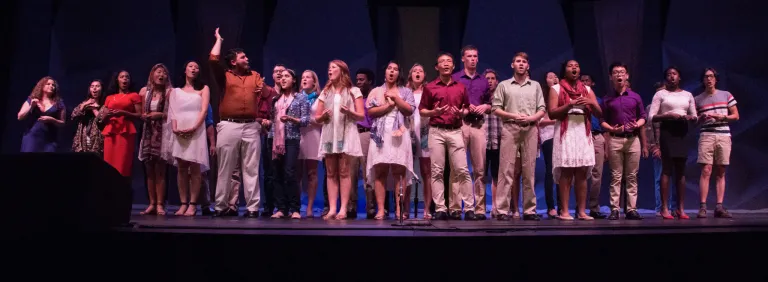
The student music group Talisman celebrated its 25th anniversary with a sold-out show last Sunday, Feb. 8, at Bing Concert Hall. Founded in 1990, Talisman is among the most popular of Stanford’s nine a cappella groups. The group has enjoyed considerable success over the years, earning recognition in national competitions and performing for the likes of Bill and Melinda Gates, Oprah and the Clintons. Sunday’s concert was a true crowd-pleaser, living up to its weighty expectations.
Last weekend’s concert was far from ordinary, as current students performed alongside more than 100 alumni to commemorate 25 years of singing, dancing, stomping and clapping. The entire group performed their signature songs together as a chorus, but for most of the show, they were divided into smaller choirs by year of participation. The sheer number of alumni present, including original founders, spoke to the enduring bond of the self-proclaimed “Talis-family.”
Though Talisman aims to perform music from across the world, Sunday’s concert consisted primarily of songs and styles from African and African-American musical traditions. The program struck a nice balance between familiar English-language songs performed in the gospel style, such as “Swing Low, Sweet Chariot” and “Motherless Child,” and those performed in African languages, such as the Lion King’s “One by One.” The music featured voice, body percussion — including clapping and step dance — and some drums. The step dance, in particular, was a crowd favorite, and the sparing but tasteful use of drums added greatly to the energy of the vocals.
The performers took every opportunity to speak to the audience in between songs. At the start, a founding member recalled that, at its inception, Talisman was Stanford’s only a cappella group dedicated to world music. The founders cited jazz legend Dizzy Gillespie — who fused Afro-Cuban dance music with then-modern jazz in the 1940s and 1950s — as a major influence.
As the concert progressed, the songs and their accompanying anecdotes grew much more serious. The group carefully explained the meaning of each song, many having deep emotional and political roots. An account of the death of a Talisman member was followed by somber ballads. They took us through a whirlwind of powerful topics from South Africa and America, including racial segregation, lynching and slavery. Talisman did not spare divisive contemporary issues, such as gender identity or the recent events in Ferguson, Missouri. These ballads were delivered with soft voices and dim lights, to great effect.
The group especially shined when singing in four-part harmony, with practiced balance and intonation among the voices, as in the traditional African-American song “Oh, Freedom.” Their dynamics were excellent, and singers were equally adept at tender ballads and rowdy African chants. They seemed to be natural performers, at great ease in the spotlight. It’s a shame that some soloists were buried under the large choir.
Overall, Talisman’s 25th anniversary concert was a big hit. From the dedication of its alumni to the personal connection forged by their powerful anecdotes, the emotional concert was a testament to the group’s enduring reputation.
Contact Blaine Rister at Blaine ‘at’ stanford.edu.
